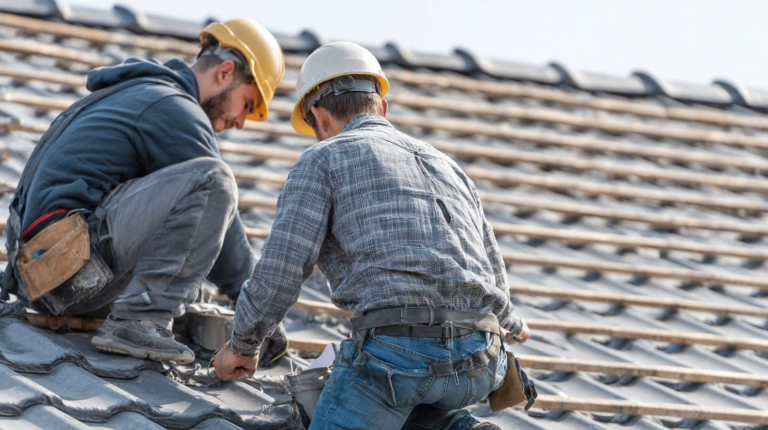Professional Waterproofing Flat Roof Slab Services You Can Trust
Look, I've been working on flat roofs in Queens for over two decades, and if there's one thing that keeps me up at night, it's seeing another botched waterproofing job on a concrete flat roof slab. Just last week on Northern Boulevard, we had to completely redo a "waterproofing" job that another contractor finished just six months ago. The owner thought he was saving money. Instead, he ended up paying twice.
Waterproofing flat roof slabs isn't just about slapping some coating on concrete and calling it a day. It's about understanding how water moves, where it pools, and what happens when Queens weather throws everything it's got at your building.
Why Concrete Flat Roof Slabs Need Proper Waterproofing
Here's the thing about concrete - it's porous. I don't care how well it was poured or how expensive the mix was. Water will find a way through concrete over time, especially with our freeze-thaw cycles here in New York. And once water gets into that concrete slab, you're looking at structural damage that makes roof replacement look cheap.
We see this constantly in older buildings throughout Astoria, Long Island City, and Jackson Heights. The concrete looks solid from below, but up on the roof? You can see the deterioration, the spalling, sometimes even rebar starting to show through. That's what happens when waterproofing on flat roof slab gets ignored or done wrong.
The salt air from the East River and Flushing Bay doesn't help either. It accelerates the corrosion process once water penetrates the concrete. My foreman Tony always jokes that we should charge extra for buildings within two miles of the water, but honestly, the whole borough deals with similar challenges.
Our Waterproofing Process for Concrete Flat Roof Slabs
At Flat Masters NY, we don't cut corners on waterproofing concrete flat roof slabs. Here's how we actually do it right:
First, we completely assess the existing slab. This means looking for cracks, checking the slope (or lack thereof), testing for moisture content, and figuring out what went wrong with any previous waterproofing attempts. You'd be amazed how many contractors skip this step and just start applying new materials over failed systems.
- Surface preparation - cleaning, crack repair, slope correction if needed
- Primer application specifically matched to the concrete and waterproofing system
- Base membrane installation with proper overlaps and seaming
- Detail work around penetrations, drains, and edges
- Quality control inspection at each phase
- Final protective layer or surfacing as appropriate
The detail work is where most contractors fail. Anyone can roll out a membrane on a flat surface, but what about around that HVAC unit? The drain? The parapet wall? These transitions are where water finds its way in, and they require specific techniques and materials that many contractors either don't know or won't spend time on.
Common Waterproofing Systems We Install
Not every flat roof slab needs the same waterproofing approach. The building's age, use, budget, and existing conditions all factor into which system makes sense.
Modified Bitumen Systems: Still one of the most reliable options for waterproofing cement flat roof applications. We use torch-applied or cold-adhesive systems depending on the situation. These systems have been protecting Queens buildings for decades when installed properly.
EPDM rubber membranes work great for many applications, especially when you need something that can handle building movement. The key is proper preparation and making sure every seam is perfect. One bad seam and you might as well not have bothered.
TPO and PVC systems are becoming more popular, especially for commercial buildings. They're heat-welded, which creates incredibly strong seams when done right. But they require specific installation techniques that not every contractor has mastered.
Liquid-applied membranes can be excellent for complex roof shapes or when you need to integrate with existing systems. But they're only as good as the installer's attention to detail and weather conditions during application.
What Makes Waterproofing Fail in Queens
I can't tell you how many times I've been called to fix a waterproofing job that failed within the first year. Usually, it comes down to a few common mistakes that could have been avoided:
Poor surface prep is the big one. If the concrete wasn't properly cleaned, if moisture wasn't dealt with, if existing coatings weren't removed - the new waterproofing system is doomed from day one. It's like painting over rust and expecting it to last.
Then there's the weather factor. Some contractors will install waterproofing systems in conditions that the manufacturer specifically warns against. Too cold, too hot, too humid, rain in the forecast - all of these affect how materials cure and bond. But when you're trying to finish a job to get paid, some contractors ignore these requirements.
Inadequate drainage is another killer. If water pools on your roof for more than 48 hours after rain, even the best waterproofing system will eventually fail. The constant exposure to standing water breaks down materials and finds every tiny imperfection.
Maintenance and Long-Term Performance
Here's something most contractors won't tell you - no waterproofing system is maintenance-free. Even the best installation needs periodic inspection and minor maintenance to reach its full lifespan.
We recommend twice-yearly inspections, especially after our harsh Queens winters. Look for any signs of membrane damage, check that drains are clear, make sure no new penetrations have been added without proper sealing. Small issues caught early can save you thousands later.
And please, if you need any work done on your roof after we've waterproofed it - HVAC repairs, new equipment installation, satellite dishes - call us first. I've seen perfect waterproofing jobs ruined by well-meaning technicians who didn't understand what they were cutting through.
Why Choose Flat Masters NY for Your Waterproofing Project
Look, I could tell you about our licenses, our insurance, our years of experience - and all of that matters. But what really sets us apart is that we actually live and work in this community. We see these buildings every day. When we do a job, our reputation drives by that address regularly.
We use materials from suppliers right here in Queens - Beacon Building Products on Northern Boulevard, SRS Distribution in Long Island City. These aren't just business relationships; they're partnerships with people who understand our local conditions and can support our work with proper materials and technical guidance.
Every waterproofing project gets my personal attention, from initial assessment through final inspection. My crew leaders - Tony, Carlos, and Miguel - have been with me for years. They know how we do things and why we do them that way.
We also stand behind our work with comprehensive warranties that actually mean something. Not just manufacturer warranties on materials, but our own guarantee on the installation. Because if we're not confident enough to warranty our work, why should you trust us with your building?
Getting Started with Your Waterproofing Project
Every building is different, and every waterproofing project starts with understanding your specific situation. We offer free, no-obligation assessments where we actually get up on your roof, look at the conditions, and explain your options in plain English.
During that assessment, we'll check the structural condition of your slab, evaluate any existing waterproofing, identify drainage issues, and discuss your building's specific needs and budget. No pressure, no sales pitch - just honest information from someone who's seen every type of flat roof problem Queens can throw at a building.
We're fully licensed (License WC-35842-H05) and insured, with references throughout Queens from property owners who trusted us with their buildings. From small residential buildings in Elmhurst to large commercial properties in Long Island City, we've successfully waterproofed flat roof slabs of every size and type.
Call us at (917) 994-7618 to schedule your assessment. We're usually booked out 2-3 weeks for assessments during busy season, but we always make time for emergency situations. And if you're dealing with active leaks, we can often provide temporary solutions while we plan the permanent fix.
Don't wait until small problems become big disasters. Professional waterproofing of your concrete flat roof slab is an investment in your building's future - and when done right, it's an investment that pays for itself in prevented damage and peace of mind.


